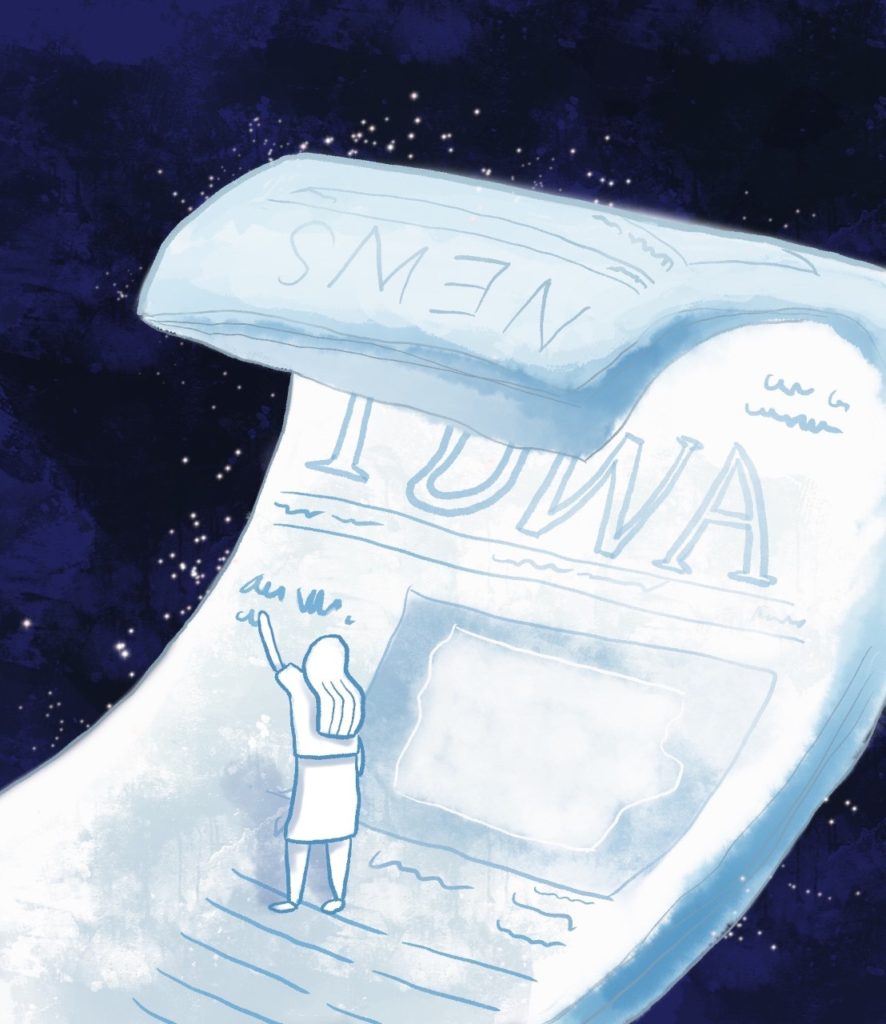When Peggy Elliott teaches her yearly guest lecture to fourth graders at Davis Elementary School, she makes sure they know two things: first, that everyone has a story and second, that to tell someone’s story, the writer must dig deep, ask precise questions and paint a mural with their writing.
Moments like these, she said, are the most rewarding parts of her job.
Elliott is the managing editor for the Grinnell Herald-Register, Grinnell’s town newspaper. Elliott and the Herald-Register staff write, produce and publish the 12-page broadsheet newspaper for publication on Monday and Thursday each week. To Elliott, the Herald-Register’s coverage of local news draws together community members and advances Grinnell’s ability to thrive as a vibrant and interconnected community.
The Herald-Register has existed for 154 years, and Elliott hopes for the paper to survive for much longer, but the Herald-Register’s future faces a brutal reality: since 2004, nearly 1,800 newspapers have gone defunct due to financial non-viability — many of them small local papers. This fate threatens the Herald-Register.
“I don’t want to think that,” Elliott said of shutting down. “We have to find a way that that’s not the outcome.”
I can tell you we’re as close to the line as most small papers are. – Peggy Elliott
The vanishing news landscape
Elliott’s family has been the lifeline of the paper since her grandfather L.B. Watt, a 1914 Grinnell alum, purchased the Herald-Register three generations ago in 1944. The familial ties are strong; Elliott’s parents and most of her siblings have served on the paper’s staff.
Before Watt bought the Herald-Register, he was the publisher and editor of the Storm Lake Register in Storm Lake, Iowa. The Register eventually changed to the Storm Lake Pilot-Tribune in 1986 and was purchased by Rust Communications, a private, Missouri-based media company.

Nowadays, the Pilot-Tribune has a circulation of less than 2,000 and competes with the locally owned Storm Lake Times. In 2021, editor Art Cullen and the rest of the Storm Lake Times staff were featured in the award-winning documentary Storm Lake, about the tremendous financial and emotional challenges of keeping a biweekly newspaper afloat, due to low circulation, falling revenue and the rise of internet-based news consumption. For decades, these trends have been endangering the viability of local newspapers across the U.S.
In 2018, the most recent year for which cumulative data is available, overall newspaper circulation shrunk by 8 percent. The COVID-19 pandemic has only exacerbated this decline: smaller local papers have laid off staff and reduced circulation of print editions because of loss of advertising when businesses closed.
As of 2022, half of all U.S. counties — 1,528 — have only one newspaper. Another 225 counties have no paper at all. These counties are generally poorer, older and less educated than average.
During the pandemic, small and independent newspapers were able to apply for financial assistance through the Paycheck Protection Program (PPP). These funds, Elliott said, allowed the Register to retain employees when revenue plummeted.
But small newspapers were not the only ones to face the pressure. In 2020, one-third of U.S. newspapers with circulation above 50,000 experienced layoffs, according to Pew. This is the highest percentage since the Center began tracking newspaper layoffs in 2017.
The Herald-Register currently has a circulation of approximately 2,200, but Elliott said she and the rest of the Register staff constantly look to grow this number. For most newspapers, the two sources of income are circulation and advertising; the vast majority of the Herald-Register’s revenue comes from advertising. However, Elliott said advertising revenue has dropped over the past several years, and she anticipates the downward trend to continue.
“I would be surprised if there’s any small business in Grinnell that isn’t struggling, and that’s certainly true of us too,” Elliott said. “I can tell you we’re as close to the line as most small papers are.”
For local newspapers west of Interstate Highway 35, the Western Iowa Journalism Foundation provides financial assistance for newspapers to stay viable. But because the Herald-Register is in eastern Iowa, it cannot access these grants.
“I can’t even imagine what a difference that would make,” Elliott said.
Competition and consolidation
In 2000, Gannett Company, the largest U.S. newspaper publisher and owner of the Des Moines Register, purchased the Montezuma Republican and the Brooklyn Chronicle, two small newspapers in their respective cities.
Gannett has faced criticism from journalists for its high number of lay-offs and its practice of consolidating multiple small newspapers into one.
Nine years after Gannett purchased the two papers, Gannett merged the Chronicle and the Republican papers into the Poweshiek County Chronicle Republican (PCCR), the only other well-circulated newspaper in the county. It has a circulation of approximately 1,000.
J.O. Parker, ex-managing editor of the Chronicle and journalist at PCCR, said that he thinks Gannett merged the two papers because neither were financially profitable. Parker said he’s thankful to Gannett for creating the PCCR, especially when other cities in Poweshiek County, like Brooklyn, lack a local newspaper.
“They are keeping it open. And they are making it available to people,” Parker said.
Fewer Grinnell residents read the PCCR than the Register. Elliott doesn’t like to discuss the PCCR, she said.
“There is no one living in or working in Grinnell who has anything to do with the Poweshiek County Chronicle Republican,” Elliott said. “It is assembled and printed and mailed from the Des Moines Register office in Des Moines.”
The PCCR once had an office on Broad Street, but in 2018, Gannett closed the office and transferred all management of the paper out of Poweshiek County. Now, stories in the PCCR are written by Gannett-affiliated freelance reporters. Then Melinda Wichmann, editor at Gannett, collects, edits and organizes the pieces at her home in Homestead. She lays out the paper, then sends the paper to staff at the Des Moines Gannett office, who then print and ship the PCCR to cities across Poweshiek County.
Local journalism and civic engagement
Lyle Muller worked as the editor for the Cedar Rapids Gazette for 25 years. In 2009, he left the Gazette to work as executive director-editor for the Iowa Center for Public Affairs Journalism. He now lives in Tiffin, a town with around 4,500 residents and located four miles away from Coralville, which has over 21,000 residents.
The North Liberty Leader, which covers Tiffin, ceased publication on Feb. 10 of this year, leaving residents of Tiffin and North Liberty lacking another option for local news. But local coverage, Muller said, is essential.
“Otherwise, there’s darkness. You do not know what’s going on in your local government until you see the impact that surprises you,” he said. Multiple studies show that when local newspapers shut down, voters are less informed about political candidates, less likely to vote split-ticket and less likely to vote in general.
“If you lose your local news outlet, your local newspaper or radio station, you’re going to find out real quickly, like I am in Tiffin, what it’s like. And that is miserable because you do not know what people are deciding on your behalf and spending your tax money to do. That’s the bottom line.”
For more information, read Opinions Editor Allison Moore’s op-ed “Endangered local papers must adapt or die” on page 7.
(Editor’s Note: Lyle Muller is the professional advisor to the S&B. He was not involved in the writing or editing of this article.)



























































Ann DeLong Haase, GHS '57 • Mar 20, 2022 at 5:34 pm
Is there any opportunity for getting and on-line subscription to the GHR?